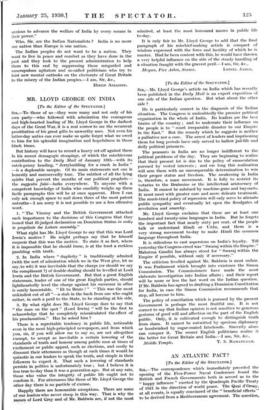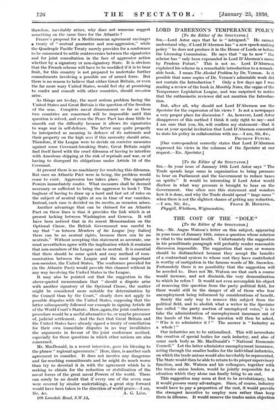AN ATLANTIC PACT?
[To the Editor of the SPECTATOR.]
St;,—The correspondence which immediately preceded the opening of the Five-Power Naval Conference found the British and French Governments both in accord as to the " happy influence " exerted by the Quadruple Pacific Treaty of 1921 in the direction of world peace. The Qua{ d'Orsay, at all events, is equally convinced of the " beneficial effects " to be derived from a Mediterranean agreement. The Question, therefore, inevitably arises, why does not someone suggest something on the same lines for the Atlantic ?
France's proposal for a Mediterranean agreement envisages a treaty of " mutual guarantee and non-aggression," while the Quadruple Pacific Treaty merely provides for a conference to be summoned to settle controversies between the signatories and for joint consultation in the face of aggressive action whether by a signatory or non-signatory State. It is obvious that the French scheme will have to be modified if it is to bear fruit, for this country is not prepared to undertake further commitments involving a possible use of armed force. But there is no reason to believe that either Great Britain, or even the far more wary United States, would feel shy at promising to confer and consult with other countries, should occasion arise.
As things are to-day, the most serious problem facing the United States and Great Britain is the question of the freedom of the seas. Complete naval disarmament so far as these two countries are concerned will be impossible until this question is solved, and even the Peace Pact has done little to smooth out the difficulty because it allows its signatories to wage war in self-defence. The latter may quite properly be interpreted as meaning in defence of its nationals and their property on the high seas if this necessity should arise. Therefore, if the League were to decide on coercive measures against some Covenant-breaking State, Great Britain might find itself faced with the cruel dilemma of having to interfere with American shipping at the risk of reprisals and war, or of havirig to disregard its obligations under Article 10 of the Covenant.
At present there is no machinery for resolving this dilemma. But once an Atlantic Pact were in being, the problem would cease to exist. Aggression has taken place. The signatory Powers immediately confer. What measures shall be deemed necessary or sufficient to bring the aggressor to book ? The bugbear of having to draw up a hard and fast set of rules on the subject of neutral rights at sea in time of war vanishes. Instead, each case is decided on its merits, as occasion arises.
Another advantage that can be claimed for an Atlantic Pact on these lines is that it provides the link which is at present lacking between Washington and Geneva. It will live been noticed that in its recent Memorandum on the Optional Clause, the British Government was careful to say that " as between Members of the League [my italics] there can be no neutral rights, because there can be no neutrals." Without accepting this statement as accurate, one must nevertheless agree with the implication which it contains that non-members of the League can be neutral. It is essential that there should be some quick and easy method of com- munication between the League and the most important non-member, the United States. The conference provided for (in the Atlantic Pact) would provide this channel without in any way involving the United States in the League.
It may also be pointed out that the suggestion in the above-quoted memorandum that " should a dispute arise with another signatory of the Optional Clause, the matter might be considered more suitable for determination by the Council than by the Court," clearly doe's not apply to possible disputes with the United States, supposing that the latter subsequently followed our example in signing Article 36 of the World Court's Statute. Here, again,the joint conference procedure would be a useful alternative to, or maybe precursor of, judicial settlement. And the fact that Great Britain and the United States have already signed a treaty of conciliation for their own immediate disputes in no way invalidates the arguments in favour of the joint conference method, especially for those questions in which other nations are also concerned.
Mr. MacDonald, in a recent interview, gave his blessing to the phrase " regional agreements." Here, then, is another such agreement to consider. It does not involve any dangerous and far-reaching commitments and he might do much worse than try to dovetail it in with the agreement which he is seeking to obtain for the reduction or stabilization of the naval forces of the great naval powers of the world. There can surely be no doubt that if every one of the seven seas were covered by similar undertakings, a great step forward would have been taken in the direction of world peace.--I







































 Previous page
Previous page